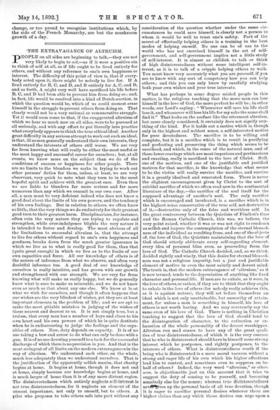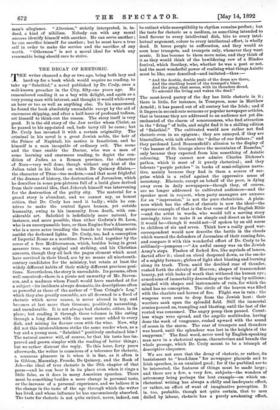'THE EXTRAVAGANCE OF ALTRUISM.
pEOPLE on all sides are beginning to talk,—they are not very likely to begin to act,—as if it were a positive sin to think of self at all, as if life ought to be lived entirely for others, and without any reference to one's own happiness or interest. The difficulty of this point of view is, that if every- body acted upon it, there might be nobody to live for. If A lived entirely for B, C, and D, and B entirely for A, C, and D, and so forth, A might very well have sacrificed his life before B, C, and D had been able to prevent him from doing so ; and, in fact, life would be resolved into a kind of Dutch-auction, in which the question would be, which of us could soonest erase himself in the struggle to prevent others from doing so. That clearly would not be a very rational or remunerative struggle. Yet it would soon come to that, if the exaggerated altruism of which we hear so much now on all sides, were to be pursued at all seriously, and with any effort to put literally into practice what everybody appears to think the true ethical ideal. Another great difficulty in any serious attempt to work out such an ideal, is that, ill as men generally understand their own interests, they understand the interests of others still worse. We are very far from knowing what will really be either the most useful or the most happy and successful career for ourselves ; but, at all events, we know more on the subject than we do of the conditions of success or happiness for other people. There are no limits to the blunders we make in trying to work out other persons' duties for them, unless, at least, we are very observant, very quick to note what they turn to in the most hopeful spirit and achieve with the greatest ease. Even then we are liable to blunders far more serious and far more numerous than any which we commit in our own case. After all, a man must be very deficient indeed who does not know a good deal about the limits of his own powers, and the tendency of his own feelings. But in relation to others, we often know so little, that the very things we do exclusively for their greatest good turn to their greatest harm. Disciplinarians, for instance, often ruin the very nature they are trying to regulate and strengthen, while over-indulgence blights the very nature it is intended to foster and develop. The most obvious of all the limitations to successful altruism is, that the attempt to live for others without regard to one's own happiness and goodness, breaks down from the much greater ignorance in which we live as to what is really good for them, than that (quite great enough) in which we live as to the limits of our own capacities and force. All our knowledge of others is of the nature of inference from what we observe, and often very doubtful inference too. A good deal of our knowledge of ourselves is really intuitive, and has grown with our growth and strengthened with our strength. We are very far from knowing what will make us really happy, but we do generally know what is sure to make us miserable, and we do not know even as much as that about any one else. We know at least what we wish for ourselves, and though it often happens that our wishes are the very blindest of wishes, yet they are at least important elements in the problem of life ; and we are apt to make the most pitiable mistakes in judging of the wishes of those nearest and dearest to us. It is not simply true, but a truism, that every man has a number of keys and clues to his own heart and his own powers of which he is quite destitute when he is endeavouring to judge the feelings and the capa- cities of others. Now, duty depends on capacity. It is of no use taking a bow and arrow to do what can only be done with a gun. It is of no use devoting yourself to a task for the successful discharge of which there is no provision in you. And that is the most stringent of all limits on the modern extravagances in the way of altruism. We understand each other, on the whole, much less adequately than we understand ourselves. That is the justification of the apparently selfish maxim, that charity begins at home. It begins at home, though it does not end at home, simply because our knowledge begins at home, and is much larger of home than it is of any more distant region. The disinterestedness which entirely neglects self-interest is not true disinterestedness, for it neglects an element of the utmost importance, not only to oneself, but to others. A pilot who proposes to take others safe into port without any
consideration of the question whether under the same cir- cumstances he could save himself, is clearly not a person to whom it would be well to trust one's safety. Part of the secret of effectually helping others is a training in the best modes of helping oneself. No one can be of use to the world who has not exercised himself in the art of self- government, and self-government implies not a little study of self-interest. It is almost as childish to talk or think of high disinterestedness without some intelligent self-in- terest, as it is to talk of a cripple helping others to walk. You must know very accurately what you are yourself, if yon are to know with any sort of competency how you can help others ; and this you can only know by carefully studying both your own wishes and your true interests.
What has perhaps in some degree misled people in this matter, is the religious teaching that the more man can lose himself in the love of God, the more perfect he will be ; in other words, our Lord's saying : "Whosoever will save his life shall lose it, and whosoever will lose his life for my sake the same shall find it." That looks on the surface like the uttermost altruism, but more closely considered, it certainly does not signify any- thing of the kind. For it holds out a motive which is, though only in the highest and noblest sense, a self-interested motive for pure devotedness. The sacrifice is to be willing and complete, but it is a sacrifice which is to result in purifying and perfecting and preserving the thing which seems to be sacrificed, and which, in the sense of the natural man, and of those lower cravings which are most imperious and pertinacious and exacting, really is sacrificed to the love of Christ. Still, one of the motives, and one of the justifiable and justified motives for that sacrifice, is the knowledge that what seems to be the victim will really survive the sacrifice, and survive it in a greatly idealised and renovated form. There is never the slightest encouragement given by Christ to the sort of suicidal sacrifice of which we often read now in the sentimental literature of the day,—the sacrifice of the soul itself for the supposed advantage of another's soul. The only sacrifice which is encouraged and inculcated, is a sacrifice which is in the highest sense conservative of the true self, not destructive of it,—destructive only of the false and worthless self. In the great controversy between the Quietists of Fenelon's time and the Roman Catholic Church, this was, we believe, the very point raised, whether it was or was not right to condemn as selfish and impure the contemplation of the eternal blessed- ness of the individual as resulting from, and one of the objects of, the love of God, the Quietists maintaining that the love of God should utterly obliterate every self-regarding element, every idea of personal bliss even, as proceeding from the love of God. The Catholic Church decided, and, as we think, decided rightly and-wisely, that this desire for eternal blessed- ness was not a religious impurity, but a just and justifiable element of motive in even the most saintly and devout mind. The truth is, that the modern extravagance of altruism,' as it is now termed, tends to the depreciation of anything like fixed character and personal life. If men are to exhale, as it were, in the love of others, or rather, if they are to think that they ought to exhale in the love of others (for nobody really achieves this, as it is against nature), they will set before themselves an ideal which is not only unattainable, but unworthy of attain- ment, for unless a man is something in himself, his love of others is not worth having. And we may reverently say the same even of his love of God. There is nothing in Christian teaching to suggest that the love of God should tend to the disintegration of character, to the extinction or ex- haustion of the whole personality of the devout worshipper. Altruism run mad ceases to have any of the great quali- ties of true disinterestedness, of which it is the very essence that he who is disinterested should have in himself some strong interest which he postpones, and rightly postpones, to the interests of others. What is disinterestedness worth if the being who is disinterested is a mere moral vacuum without a strong and eager life of his own which his higher affections lead him to control, and sometimes even to suppress, on be- half of others? Indeed, the very word "altruism," or other- ness, is objectionable just on this account that it tries to suggest the duty of ceasing to be yourself, and becoming somebody else for the nonce; whereas true disinterestedness nevastoives up the personal basis of all true devotion, though it is eager to sacrifice personal desires wherever there are higher claims than any which those desires can urge upon a
man's allegiance. "Altruism," strictly interpreted, is, in- deed, a kind of nihilism. Nobody can with any moral success identify himself with another. He can serve another; he can sacrifice himself for another; but he must have a true self in order to make the service and the sacrifice of any worth. " Otherness " is not a moral ideal for which any reasonable being should care to strive.







































 Previous page
Previous page